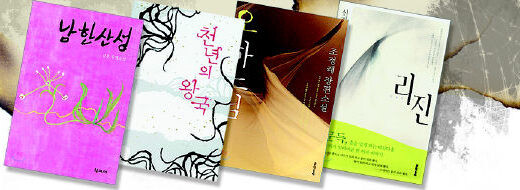hankyoreh
Links to other country sites 다른 나라 사이트 링크
This summer's bestseller ticket: historical fiction

Novels based on historical fiction are all the rage in South Korea, with many more of such books slated to hit bookstores across the nation this summer.
With "Namhansanseong" by Kim Hun keeping the top spot on the best-seller list since its release in mid-April, Shin Kyong-suk's "Lee Jin" and Kim Gyeong-uk's "The Kingdom of Millennium" have been put out to quench this unusually large thirst for historical fiction.
Earlier next month, Kim Byeol-a, known for "Misil," is expected to unveil "Nongae," while Kim Yeon-su will come out with "Sing for Night" and Lee Gi-ho will release "Dear Olbori." Those historical fiction works followed the earlier release of such books as Cho Jong-rae's "Oh God," Song Eun-il's "Banya." Leading the previous popularity were such historical novels as Hwang Sok-yong's "Sim Cheong," Kim Young-ha's "Dark Flowers," Jeon Kyung-rin's "Hwang Jini," and Kim Hun's "Songs of Swords" and "Songs of Strings."
Most of the recent Korean historical novels are related to the Joseon Era (1392-1910) or the Japanese colonial era (1910-1945).
What is behind the explosive popularity of historical fiction? Han Gi-ho, a book columnist, explained such "faction" novels - "fact" melded with "fiction" - as "The Da Vinci Code" sparked a sharp interest among Koreans in history-themed novels.
"Undergoing tumultuous times [from the colonial age to Korean war to dictatorship to the present], many South Koreans tend to enjoy historical re-creations and mysteries, a reason why such books are appealing here," Han said.
Meanwhile, novelists say that there is little difference between historical novels and modern ones. Shin Kyong-suk said that she wants her new book "Lee Jin" to be read as a contemporary novel. Kim Gyeong-uk also said that he does not think about whether he is writing a historical novel or a contemporary one when he starts penning a book.
But few deny that historical novels have their own special appeal. Lee Myeong-won, a book critic, said the unusual popularity of historical fiction can be ascribed to the easiness with which novelists find things to write about, compared to the difficulty authors face when trying to grapple with what is transpiring now in current society. In addition, authors are able to ride on the interest surrounding historical events in which people tend to hold fascination.
He urged novelists to write books in which readers could mirror in their present life lessons learned from historical events.
Please direct questions or comments to [englishhani@hani.co.kr]
Editorial・opinion
![[Guest essay] Maybe Korea’s rapid population decline is an opportunity, not a crisis [Guest essay] Maybe Korea’s rapid population decline is an opportunity, not a crisis](https://flexible.img.hani.co.kr/flexible/normal/500/300/imgdb/original/2024/0430/9417144634983596.jpg) [Guest essay] Maybe Korea’s rapid population decline is an opportunity, not a crisis
[Guest essay] Maybe Korea’s rapid population decline is an opportunity, not a crisis![[Column] Can Yoon steer diplomacy with Russia, China back on track? [Column] Can Yoon steer diplomacy with Russia, China back on track?](https://flexible.img.hani.co.kr/flexible/normal/500/300/imgdb/original/2024/0430/1617144616798244.jpg) [Column] Can Yoon steer diplomacy with Russia, China back on track?
[Column] Can Yoon steer diplomacy with Russia, China back on track?- [Column] Season 2 of special prosecutor probe may be coming to Korea soon
- [Column] Park Geun-hye déjà vu in Yoon Suk-yeol
- [Editorial] New weight of N. Korea’s nuclear threats makes dialogue all the more urgent
- [Guest essay] The real reason Korea’s new right wants to dub Rhee a founding father
- [Column] ‘Choson’: Is it time we start referring to N. Korea in its own terms?
- [Editorial] Japan’s rewriting of history with Korea has gone too far
- [Column] The president’s questionable capacity for dialogue
- [Column] Are chaebol firms just pizza pies for families to divvy up as they please?
Most viewed articles
- 1Under conservative chief, Korea’s TRC brands teenage wartime massacre victims as traitors
- 2[Guest essay] Maybe Korea’s rapid population decline is an opportunity, not a crisis
- 3Months and months of overdue wages are pushing migrant workers in Korea into debt
- 4[Column] Can Yoon steer diplomacy with Russia, China back on track?
- 5‘We must say no’: Seoul defense chief on Korean, USFK involvement in hypothetical Taiwan crisis
- 6After election rout, Yoon’s left with 3 choices for dealing with the opposition
- 7First meeting between Yoon, Lee in 2 years ends without compromise or agreement
- 8[Column] Behind factional animus of Korean politics, victim mentality festers
- 9Dermatology, plastic surgery drove record medical tourism to Korea in 2023
- 10Why Kim Jong-un is scrapping the term ‘Day of the Sun’ and toning down fanfare for predecessors